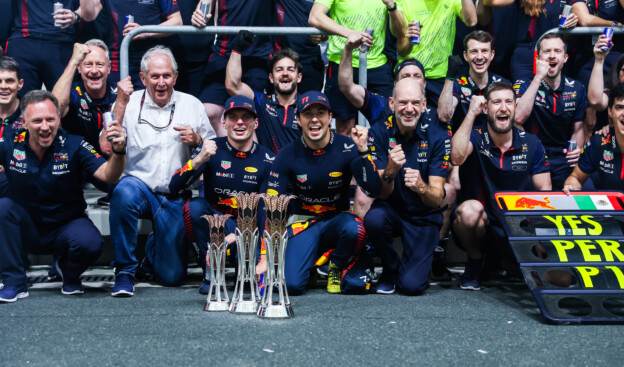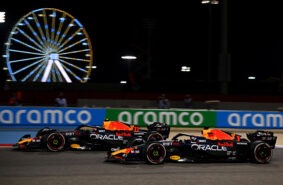With another convincing 1-2 in the 2023 Saudi Arabian Grand Prix, has started the 2023 Formula 1 season with utter dominance in the first two events. The victory for Sergio Pérez and P2 for championship-leader (after starting in P15 due to a driveshaft issue in Q2) proved that Red Bull's RB19 is clearly the car to follow throughout the current campaign of Formula 1 racing.
Although there were some shows of frustration from Verstappen's camp, the Austrian team is definitely on a high currently, taking all points available so far (there wasn't a point for Fastest Lap in the first event, as Zhou Guanyu's Alfa Romeo was not in the Top 10 when he went for the Fastest Lap).
Now with 87 points in two races and a healthy advantage in the World Constructors' Championship over Aston Martin and Mercedes (38 points each), Red Bull is certainly looking like a team that will carry the results of the by itself. Given the car advantage, others can have a shot at victory only when something fails for Red Bull during a race, and even something like a botched 10-second pitstop might not be enough to open the door for any other team.
Red Bull's consecutive 1-2s to start the 2023 Formula 1 season is an unprecedented achievement for the team, although it ranks fifth in all-time 1-2s with 24 in 349 races.
Red Bull is only the second team in the 21st century to start a Formula 1 season with consecutive 1-2s and it shows how the team's RB19 is working fantastically at the right time. Even with the issue on Verstappen's car during qualifying, it still helped the Dutchman to easily achieve a podium in the Saudi Arabian round.
In this article, we will take a look at the three most recent teams to start a Formula 1 campaign with consecutive 1-2s.
Without further ado, let us take a look.
#3 McLaren-Mercedes - 1998 Formula 1 season
After winning the 1997 European Grand Prix in weird circumstances, as the eventual F1 champion Jacques Villeneuve allowed the two McLarens through late in the race, came to the 1998 Formula 1 season looking to compete for the Drivers' championship.

McLaren MP4-13 Mercedes driven by David Coulthard (1998)
The campaign started well for the Finn driver and his teammate David Coulthard, with a tremendous 1-2 in the 1998 Australian Grand Prix, while both cars lapped the entire field. Even though Coulthard slowed down and allowed Hakkinen to retake the lead, the situation only occurred due to a misunderstanding on Hakkinen's part over the radio which prompted an unscheduled pitstop.
The situation at Australia proved controversial, but followed it up with another 1-2 at the Brazilian Grand Prix, with Hakkinen again winning from Pole Position ahead of Coulthard, while also recording the Fastest Lap of the race, as he did in Australia.
Michael Schumacher finished third for Ferrari, but one minute behind the race-winning MP4/13 of Hakkinen. The weekend had another controversy, as Ferrari protested McLaren's third pedal on the car, which was effectively a rear brake pedal, and the FIA banned the system despite declaring it legal on several prior occasions.
McLaren went on to win the with Hakkinen (his first ever and the team's first since Ayrton Senna's 1991 title) and the 1998 World Constructors' Championship, the first for McLaren since 1991 and the last to date (eighth in team's history).
Although the team won both titles, it wasn't a dominant team for McLaren, as Ferrari and Michael Schumacher's testing program managed to match the MP4/13's pace, and maybe even made the F300 the best car late in the season.
McLaren won nine of the 16 races in 1998, with Hakkinen winning eight.
#2 Mercedes - 2019 Formula 1 season
Although Ferrari seemed the strongest team in pre-season testing, Mercedes went to Australia with the and opened the season with a dominant 1-2 headed by Valtteri Bottas, while Lewis Hamilton had put the car on Pole Position on Saturday.

2019 Australian F1 GP podium with Valtteri Bottas and Lewis Hamilton
Mercedes went on to dominate both the World Constructors' and Drivers' Championships in 2019, with Hamilton winning his sixth F1 title. On their way to those achievements, Mercedes started the campaign with a record five consecutive 1-2s, breaking the previous F1 record to start a season (three by Williams in 1992).
Even though the W10 proved to be the class of the field in the first half of the season, the team's 1-2 in the second race, the 2019 Bahrain Grand Prix, came after Ferrari had a disappointing outing after a 1-2 in Qualifying and also during most of the race. Reliability and driving mistakes from the Ferrari camp helped Mercedes start the year with consecutive 1-2s for the first time in the Hybrid Era.
won 15 of the 21 races in 2019 (11 for Hamilton), with nine 1-2s and also winning the first eight GPs in a row. Starting from the last two events of 2018, Mercedes put up a streak of 10 consecutive wins, the second-largest in F1 history (McLaren had 11 in 1988) and matching the best in Mercedes' history (achieved three times).
#1 Red Bull - 2023 Formula 1 season
Red Bull has been massively dominant to start the 2023 Formula 1 season, as its car, the RB19, has been the class of the field in the early stages, and it looks unbeatable for the rest of the campaign.

Max Verstappen and Sergio Perez driving Red Bull Racing RB19 during the 2023 F1 Grand Prix of Bahrain
Many have suggested that the team could win every race in the , but that's definitely a tall task and lots of things can go wrong in 23 events throughout the season.
Still, a 1-2 led by Max Verstappen in the 2023 Bahrain GP and another one, led by Sergio Pérez in the 2023 Saudi Arabian Grand Prix have put Red Bull in a tremendous position for both titles, already two races after the season's start.
The team has never had a 1-2 in the World Drivers' Championship standings, but it would be shocking if the
Milton Keynes-based squad doesn't achieve that feat at the end of the 2022 Formula One World Championship campaign.
Even with Max Verstappen starting 15th in the Saudi Arabian round, the team pulled off an easy 1-2, putting up 20 seconds against the second-best car (Aston Martin) in a span of 30 laps after a Safety Car period.
The last two teams to start a Formula 1 season with consecutive 1-2s won both titles and had their two drivers in the Top 3 in the WDC standings (Mercedes had a 1-2 in the WDC table in 2019). Can Red Bull emulate those results? It certainly looks likely, given how little the rest of the field can try performance-wise, given the current Budget Cap that limits the teams' car development, at least on a large scale.
Verstappen already won a single-season record 15 races in 2022 but he and his team could be headed to another record-breaking campaign behind the dominance of the RB19.
















